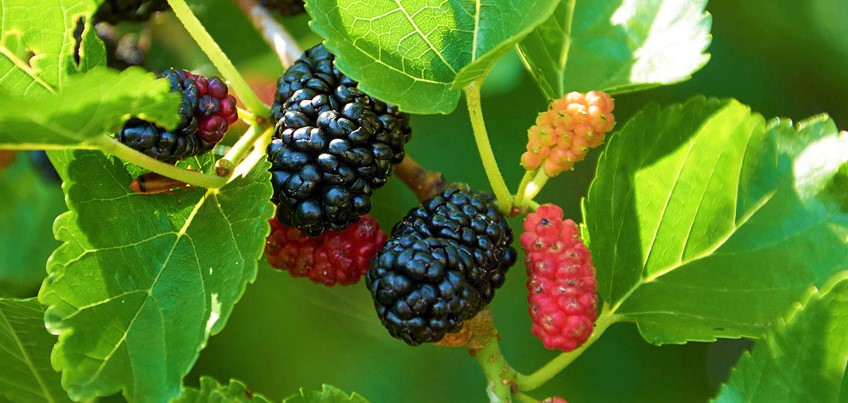Mullberry
Mulberry, (genus Morus), genus of about 10 species of small trees in the Moraceae family and their delicious fruits. Blackberries are native to Asia and North America, and various species are grown for their fruit and ornamental plants. Mulberry is also important as food for silkworms.
Physical description
Mulberries are trees that grow and have teeth, sometimes lobed leaves, arranged on the other side of the stem. Individuals can be monoecious (bearing both male and female flowers) or dioecious (bearing only male or female flowers). The small flowers are borne in clusters of strong catkins. Each seed develops from a whole flower cluster and is properly referred to as a cluster. The fruits look like blackberries and are white, pink, red or purple.
planting
In the wake of planting , it takes around five to eight years before the trees begin bearing natural products. The life expectancy of a mulberry tree is around 30 to 40 years.
Reaping
Many spots in the US, for example, California and New York typically have a fourteen day window for gathering the mulberries every year. Each tree can deliver up to 2.5 kilograms of organic product.
Utilizations and Arrangement
One of the most famous purposes for mulberries is in making wine. It tastes sweet, and when blended in with different berries, for example, blackberries, it makes a heavenly mix of wine.
The berries can likewise be eaten crude or used to make jam or jams. They can be tracked down dried and bundled in various stores.
Dried mulberries can be eaten as a bite or utilized as a sugar in recipes.
The leaves and parts of the natural product tree are not consumable.
Healthy benefit and Medical advantages


Mulberries are exceptionally high in cancer prevention agents like flavonoids and polyphenols. These cell reinforcements give the berries their rich, profound purple tone.
Cancer prevention agents help to forestall cell harm that can cause malignant growth and different sicknesses.
Mulberries likewise contain B-complex nutrients, L-ascorbic acid, dietary fiber and a modest quantity of protein.
More Realities About the Mulberry Organic product Tree
The name “mulberry” comes from the Center English word morel and Early English mora, and that signifies “dim looking.”
The surface of the berries can measure up to that of a raspberry. The shade of the skin when picked can go from white to purple.
Mulberries were utilized as metal rollers in the primary current ball point pens.
In Korea, mulberries are refined to make an alcohol called mulberry soju.
In North America, the mulberry tree was established by Local Americans along fringes of their ancestral domains. The Local Americans then, at that point, involved the berries for food.
The silk from which silkworms feed is really gotten from the tacky leaves of the white mulberry tree and not the natural product itself.
American trailblazers made pemmican out of dried and ground bison meat blended in with dissolved fat and afterward pressed in creature organs. The pemmican would be put away in these organs and the tops tied shut with a mulberry leaf to keep the meat new
Mulberry
The antiquated Greeks accepted that the tree was hallowed to Dionysus, the divine force of wine, agribusiness and fruitfulness.
In certain nations, the parts of the mulberry tree are laid across hovel rooftops to keep them watertight.
The mulberry tree is an obtrusive species in Florida, where it stifles out other local plant species and causes deforestation. It must be legitimately traded in Florida on the off chance that it has a label on it.
The silkworm isn’t a worm by any stretch of the imagination, yet rather the caterpillar of the moth Bombyx mori.
In Japan, the mulberry is called momo. It is the public tree of Osaka and the city’s true blossom is the sasanqua rose, which is otherwise called the “momo no hana” or “mulberry blossoms.”
In Korea, an exceptional silk called mulberry silk or ramie is produced using the strands of the ramie plant.
The mulberry natural products look like the groups of little merpeople, which roused the expression “mulberry man” to depict a shaman who could gather spirits submerged.
In the old Roman Catholic Church, clerics would wear a mulberry shaded robe likewise once in a while called a “mullus.”
Both Jesus and Muhammad are said to have worn white mulberry robes.
The mulberry is the public tree of Korea.
The most seasoned living tree on the planet might be a 5,000-year-old goliath mulberry situated in China. It is named the “Dorasilla” tree.
Mulberries types
Notwithstanding, these berries presently develop all through quite a bit of Europe.
Notwithstanding the “dark” in their name, these mulberries are a dim purple tone, and they have a somewhat sweet, tart flavor.
Red Mulberries (Morus rubra)
Red mulberries began in North America, and they range in variety from splendid dark red to a shade of burgundy.
Like dark mulberries, this assortment has a marginally tart flavor.
White Mulberries (Morus alba)
White mulberries are local to East Asia, and they are common all through Eastern China, Korea, and Japan.
Dissimilar to dark and red mulberries, the white assortment has a better taste without the unpleasant vibes.
Most business dried mulberry items are white mulberries.

